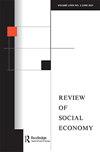设计财政-货币关系:欧盟的政策选择
IF 1.6
Q2 ECONOMICS
引用次数: 2
摘要
近几十年来,特别是在向独立中央银行转变以来,财政和货币政策没有明确的协调。在欧元区,这种缺乏协调是一个重要缺陷,尤其是因为欧元区不是一个最佳货币区。用转移联盟来补充货币联盟是一种可能的解决方案。本文认为,2008年后和新冠肺炎后非常规货币政策对收入不平等的负面影响为协调财政和货币政策提供了第二个理由。在实施这种协调的各种制度安排中,本文为欧洲央行在制定货币政策时应敏感考虑分配因素的观点辩护。只要彻底的转移联盟仍然不可行,这样的安排将有助于遏制货币政策的分配副作用,并至少部分弥补欧元区核心的缺陷。本文章由计算机程序翻译,如有差异,请以英文原文为准。
Designing the fiscal-monetary nexus: policy options for the EU
In recent decades, and in particular since the shift towards independent central banks, there has been no explicit coordination of fiscal and monetary policy. In the Eurozone, this lack of coordination represents an important flaw, especially since the Eurozone is not an optimal currency area. Complementing monetary union with a transfer union represents one possible solution. This paper argues that the negative impact of post-2008 and post-Covid-19 unconventional monetary policy on income inequalities provides a second reason to coordinate fiscal and monetary policy. Among various institutional arrangements to implement such coordination, the paper defends the idea that the European Central Bank should be sensitive to distributive considerations when formulating its monetary policy. Such an arrangement would help both to contain the distributive side-effects of monetary policy and to at least partially remedy the flaw at the heart of the Eurozone as long as an outright transfer union remains unfeasible.
求助全文
通过发布文献求助,成功后即可免费获取论文全文。
去求助
来源期刊

REVIEW OF SOCIAL ECONOMY
ECONOMICS-
CiteScore
2.60
自引率
10.00%
发文量
18
期刊介绍:
For over sixty-five years, the Review of Social Economy has published high-quality peer-reviewed work on the many relationships between social values and economics. The field of social economics discusses how the economy and social justice relate, and what this implies for economic theory and policy. Papers published range from conceptual work on aligning economic institutions and policies with given ethical principles, to theoretical representations of individual behaviour that allow for both self-interested and "pro-social" motives, and to original empirical work on persistent social issues such as poverty, inequality, and discrimination.
 求助内容:
求助内容: 应助结果提醒方式:
应助结果提醒方式:


